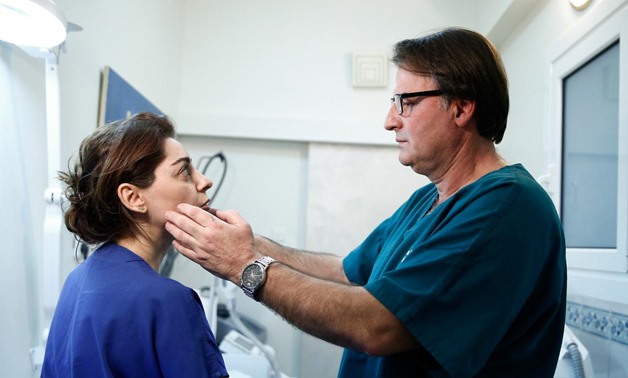
Dr Stefanos Stathakis examines a customer's face following a Botox injection at his office in Athens, Greece, December 12, 2017. REUTERS/Costas Baltas
ATHENS - 28 December 2017: Eva Vorlioti, a divorced mother of two, was forced to move back in with her parents to make ends meet during Greece’s debt crisis. While she cannot change the past, she is trying to efface one of its reminders: Her wrinkles.
Wiping her face with a cotton pad after a Botox injection, the 49-year-old supermarket worker said she has cut down on petrol and entertainment to afford the treatments, which make the skin appear smoother by temporarily paralyzing muscles.“I want to look at myself in the mirror and feel good. I‘m afraid of aging,” Vorlioti said. “Work, the crisis, they push you down and you want something uplifting.”
She is not the only one seeking solace in beauty treatments amid a financial crisis that cut hundreds of thousands of jobs cut, slashed salaries and caused a sharp decline in life satisfaction among Greeks.
In fact, it seems Greece is undergoing what has been dubbed the “lipstick effect”, where consumers turn to low cost beauty to boost their mood during economic depressions.
Non-surgical procedures in Greece soared to more than 220,000 in 2016 compared to around 61,000 in 2010, the biggest jump in Europe in the six-year period, according to data by the International Society of Aesthetic Plastic Surgery (ISAPS).
At between 80 and 150 euros a pop, it doesn’t come cheap for Greeks, who earn an average net monthly income of about 780 euros. Some, like Vorlioti, need to save up for months in order to be able to afford a treatment and yet more are choosing to have them, doctors say.
“The crisis has brought new people to the doctor’s doorstep, people who wouldn’t come before, both men and women who are struggling and want to improve their looks to feel better,” said Lia Papadavid, a dermatologist.
“It’s like giving themselves a present,” she told Reuters shortly after giving a middle-aged female a filler injection around her eyes.
The rise in Greece follows a world-wide upward trend in non-surgical procedures. It ranked 14th in the world among the top 24 countries in terms of volume of non surgical treatments in 2016, behind countries such as Italy and Germany but above Belgium, according to ISAPS.
Surgical treatments, which can cost thousands of euros, are up only 10 percent since 2010.
“LOVE YOURSELF”
Waiting her turn at the Athens Aurum medical center, 43-year-old Eleni says she turned to injectables in 2013 and has not stopped despite the crisis.
“No one has money to spare, everyone is being pressured right now with the crisis, some less, some more. I think it needs a bit of planning, and to love yourself.”
Investment in the beauty industry doubled between 2009-2015, said the Hellenic Federation of Enterprises in a July report.
New nail bars and beauty centers have popped up in central Athens and in the central Syntagma square, young men and women are seen handing out flyers advertising discounts on cosmetic services to passers-by.
Chairman of the ISAPS Education Council Paraskevas Kontoes said the surge in non invasive treatments could be explained by their low cost, better results thanks to new technology and people needing to boost their self-esteem battered by years of crisis.
Non surgical beauty treatments are fast enough to have in a lunch break, but their effects are only temporary. Results can last eight months or longer depending on the product, Dr Stefanos Stathakis said.
He also said most people choose treatments for the face, tying in with other doctors’ reports that their clients believe they can help them score better in a job interview, particularly as competition for jobs in Greece is fierce.
“They believe it will become easier for them to get a job,” said Vorlioti’s dermatologist Froso Saksioni. “People struggle and come here for a change. If you charge them a fortune for a treatment it’s like giving them a slap instead.”
As Saksioni prepares for “a vampire lift”, where the doctor withdraws and then reinjects a patient’s blood to erase wrinkles, Vorlioti books her next appointment.
“I’ve decided to cut down on everything else to do this”, she said. “When I feel good about myself, I think it shows.”


Comments
Leave a Comment